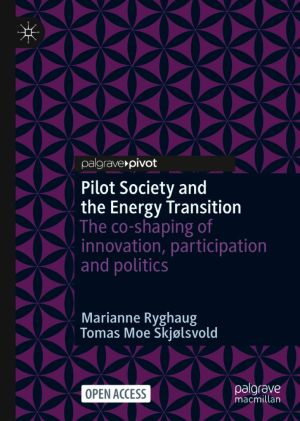Pilot Society and the Energy Transition
The co-shaping of innovation, participation and politics
by Marianne Ryghaug, Tomas Moe Skjølsvold
DescriptionDetailsHashtagsReport an issue
Marianne Ryghaug is a professor of Science and Technology Studies at the Norwegian University of Science and Technology where she leads the research group on Energy, Climate and Environment. Over the last twenty years, her work has focused on the linkages between energy and climate policy, technological development and innovation, and public participation.
Tomas Moe Skjølsvold is a professor of Science and Technology Studies at the Norwegian University of Science and Technology. He is the deputy director of the Norwegian Centre for Energy Transition Strategies (NTRANS) and has published extensively on socio-technical aspects of energy transitions, as well as scientific processes within climate and sustainability science over the last years. 






Book Description
This open book examines the role of pilot and demonstration projects as crucial devices for conducting innovation in the context of the energy transition. Bridging literature from sustainability transitions and Science and Technology Studies (STS), it argues that such projects play a crucial role, not only in shaping future energy and mobility systems, but in transforming societies more broadly. Pilot projects constitute socio-technical configurations where imagined future realities are materialized. With this as a backdrop, the book explores pilot projects as political entities, focusing on questions of how they gain their legitimacy, which resources are mobilized in their production, and how they can serve as sites of public participation and the production of energy citizenship. The book argues that such projects too often have a narrow technology focus, and that this is a missed opportunity. The book concludes by critically discussing the potential roles of research and innovation policy in transforming how such projects are configured and conducted.Marianne Ryghaug is a professor of Science and Technology Studies at the Norwegian University of Science and Technology where she leads the research group on Energy, Climate and Environment. Over the last twenty years, her work has focused on the linkages between energy and climate policy, technological development and innovation, and public participation.
Tomas Moe Skjølsvold is a professor of Science and Technology Studies at the Norwegian University of Science and Technology. He is the deputy director of the Norwegian Centre for Energy Transition Strategies (NTRANS) and has published extensively on socio-technical aspects of energy transitions, as well as scientific processes within climate and sustainability science over the last years.
This open book is licensed under a Creative Commons License (CC BY). You can download Pilot Society and the Energy Transition ebook for free in PDF format (1.7 MB).
Book Details
Title
Pilot Society and the Energy Transition
Subject
Sociology and Social Sciences
Publisher
Palgrave Pivot
Published
2021
Pages
137
Edition
1
Language
English
ISBN13
9783030611835
ISBN10
3030611833
ISBN13 Digital
9783030611842
ISBN10 Digital
3030611841
PDF Size
1.7 MB
License

Related Books

This open book questions the stereotype depicting all Gulf (GCC) economies as not sustainable, and starts a critical discussion of what these economies and polities should do to guarantee themselves a relatively stable future.
Volatile international oil markets and the acceleration of the energy transition has challenged the notion that oil revenu...

In this updated edition of a groundbreaking text, concepts such as energy return on investment (EROI) provide powerful insights into the real balance sheets that drive our "petroleum economy." Hall and Klitgaard explore the relation between energy and the wealth explosion of the 20th century, and the interaction of internal limits to grow...

"This compact book argues that ideas about accountability and legitimation – drawn from work on environmental governance – can open up new analytical perspectives on what is holding back effective energy system transformation. With bite-size chapters and illustrative cases that draw on the work of five expert witnesses, this is a novel int...

Architecture and the Novel under the Italian Fascist Regime discusses the relationship between the novel and architecture during the Fascist period in Italy (1922-1943). By looking at two profoundly diverse aesthetic phenomena within the context of the creation of a Fascist State art, Billiani and Pennacchietti argue that an effort of construction,...

Lifestyle in Siberia and the Russian North breaks new ground by exploring the concept of lifestyle from a distinctly anthropological perspective. Showcasing the collective work of ten experienced scholars in the field, the book goes beyond concepts of tradition that have often been the focus of previous research, to explain how political, economic ...

This book advocates for the Social Sciences and Humanities to be more involved in energy policymaking. It forms part of the European platform for energy-related Social Sciences and Humanities' activities, and works on the premise that crossing disciplines is essential. All of its contributions are highly interdisciplinary, with each chapter gr...

